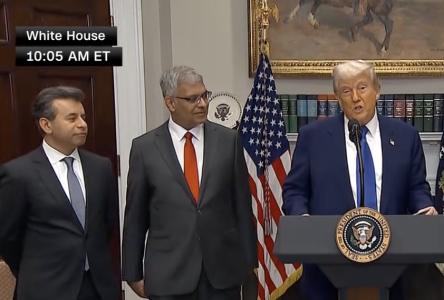How Trump’s latest executive order could impact your Medicare and Medicaid benefits—What you need to know
- Replies 0
If you rely on Medicare or Medicaid, you know that prescription drug costs can be a major source of stress—and sometimes, a real financial burden.
So when headlines start buzzing about a new executive order from former President Donald Trump promising to slash drug prices, it’s only natural to wonder: What does this mean for me? Is real relief finally on the way?
At The GrayVine, we’re here to break down what’s really happening, what could change, and what you should watch for in the months ahead. Let’s dig in.
What’s in Trump’s Executive Order on Drug Prices?
Former President Donald Trump has signed a new executive order aimed at lowering prescription drug prices—a move that has caught the attention of Medicare and Medicaid recipients across the country.
With nearly 70 million Americans relying on Medicare and close to 80 million on Medicaid, changes to drug pricing could have major implications for older and low-income populations.
Trump’s new directive is centered on a “most favored nation” pricing model, an idea he championed during his first term but was ultimately blocked in court.
What the Executive Order Does
Signed on Monday, the executive order seeks to bring down prescription drug costs in the US, where consumers pay three times more on average than patients in other countries. According to Trump, the policy would reduce prices “almost immediately, by 30% to 80%.”

Calling it “one of the most consequential Executive Orders in our Country's history,” Trump posted on Truth Social that the move would bring swift financial relief.
The plan gives drugmakers 30 days to meet specific pricing benchmarks. If those targets aren't met, the federal government could take further action within six months.
However, legal and logistical challenges may delay or derail implementation altogether.
What Experts Are Saying
While the proposal sounds promising to many Americans, financial and health policy experts remain skeptical.
Also read: Medicare bills skyrocketing–uncover the shocking prices of Ozempic and Trulicity and how it affects you!
"For Medicare, any potential savings would mainly affect specialty drugs. Think cancer treatments and other infusions. It's not addressing everyday prescriptions most seniors pick up at their pharmacy. And for Medicaid recipients, the details are even vaguer," said Michael Ryan, founder of MichaelRyanMoney.com.
"Bottom line? This is more political promise than practical policy at this point. If you're on Medicare or Medicaid and struggling with drug costs, I wouldn't count on relief coming from this particular order."
The pharmaceutical industry has also pushed back. Alex Schriver, a spokesperson for PhRMA, the industry's largest lobbying group, argued, “Government price setting in any form is bad for American patients. Policymakers should focus on fixing the flaws in the US system, not importing failed policies from abroad.”
On the political side, Senator Ron Wyden (D-Ore.) criticized the move as performative.
Source: Click On Detroit | Local 4 | WDIV / Youtube.
“Trump spent his entire first term blathering about Big Pharma, but in the end he always backed down instead of fighting for American seniors and families... If Trump was serious about lowering drug prices, he would work with Congress to strengthen Medicare drug price negotiations, not just sign a piece of paper.”
Will the Order Survive Legal Scrutiny?
Experts agree that legal challenges are almost certain—just like the last time.
"I'd say yes, it's likely to face the same legal challenges as before," said Kevin Thompson, CEO of 9i Capital Group. "Courts blocked the original version in 2020 because it bypassed the standard rulemaking process... I'd expect a similar outcome this time unless they find a way to address those procedural issues."
Alex Beene, a financial literacy instructor at the University of Tennessee at Martin, added that the plan feels familiar.
Also read: Is your Medicare coverage changing? Unveiling the latest update
"The new administration is going back to what was attempted to be implemented during the first Trump presidential term by slashing drug prices... It’s also fair to note during the first Trump term, a federal judge ruled against the implementation and put plans on ice for the reduction. It remains to be seen if this plan will face the same legal opposition."
Drew Powers, founder of Powers Financial Group, echoed those concerns: "The pharmaceutical lobby is big and powerful... They have been able to sway both Democratic and Republican leadership, and they have had success in the past in stopping these efforts in court."
"Don't expect cheaper prescriptions anytime soon. If ever. This executive order is more of a 'we'll see' than an immediate help," said Michael Ryan.
Source: CBS News / Youtube.
What Comes Next?
While the executive order sets a 30-day timeline for drugmakers to adjust pricing, the real test will come in the months ahead. If companies fail to make “significant progress,” further federal action is expected.
"It's déjà vu. Trump tried something similar back in 2020, but it got tied up in court battles and never actually happened," Ryan said. "This version is a bit broader, but faces all the same hurdles."
"The timeline here is really important. Even in the best-case scenario, we're talking months before anyone might see changes, if it is ever implemented... The pharma industry is already calling it a 'bad deal.' They've beaten similar efforts before, and they've got deep pockets to try again."
In earlier news: Something big is coming to the drug industry—and it might change everything

Have you struggled with high prescription drug costs? Do you have tips for saving money on medications, or questions about how these policies could affect you? We want to hear from you! Share your experiences and advice in the comments below, but please remember to remain respectful.
So when headlines start buzzing about a new executive order from former President Donald Trump promising to slash drug prices, it’s only natural to wonder: What does this mean for me? Is real relief finally on the way?
At The GrayVine, we’re here to break down what’s really happening, what could change, and what you should watch for in the months ahead. Let’s dig in.
What’s in Trump’s Executive Order on Drug Prices?
Former President Donald Trump has signed a new executive order aimed at lowering prescription drug prices—a move that has caught the attention of Medicare and Medicaid recipients across the country.
With nearly 70 million Americans relying on Medicare and close to 80 million on Medicaid, changes to drug pricing could have major implications for older and low-income populations.
Trump’s new directive is centered on a “most favored nation” pricing model, an idea he championed during his first term but was ultimately blocked in court.
What the Executive Order Does
Signed on Monday, the executive order seeks to bring down prescription drug costs in the US, where consumers pay three times more on average than patients in other countries. According to Trump, the policy would reduce prices “almost immediately, by 30% to 80%.”

Donald Trump has signed an executive order aiming to significantly lower prescription drug prices in the United States, using a “most favored nation” pricing model. Image source: CNN / Youtube.
Calling it “one of the most consequential Executive Orders in our Country's history,” Trump posted on Truth Social that the move would bring swift financial relief.
The plan gives drugmakers 30 days to meet specific pricing benchmarks. If those targets aren't met, the federal government could take further action within six months.
However, legal and logistical challenges may delay or derail implementation altogether.
What Experts Are Saying
While the proposal sounds promising to many Americans, financial and health policy experts remain skeptical.
Also read: Medicare bills skyrocketing–uncover the shocking prices of Ozempic and Trulicity and how it affects you!
"For Medicare, any potential savings would mainly affect specialty drugs. Think cancer treatments and other infusions. It's not addressing everyday prescriptions most seniors pick up at their pharmacy. And for Medicaid recipients, the details are even vaguer," said Michael Ryan, founder of MichaelRyanMoney.com.
"Bottom line? This is more political promise than practical policy at this point. If you're on Medicare or Medicaid and struggling with drug costs, I wouldn't count on relief coming from this particular order."
The pharmaceutical industry has also pushed back. Alex Schriver, a spokesperson for PhRMA, the industry's largest lobbying group, argued, “Government price setting in any form is bad for American patients. Policymakers should focus on fixing the flaws in the US system, not importing failed policies from abroad.”
On the political side, Senator Ron Wyden (D-Ore.) criticized the move as performative.
Source: Click On Detroit | Local 4 | WDIV / Youtube.
“Trump spent his entire first term blathering about Big Pharma, but in the end he always backed down instead of fighting for American seniors and families... If Trump was serious about lowering drug prices, he would work with Congress to strengthen Medicare drug price negotiations, not just sign a piece of paper.”
Will the Order Survive Legal Scrutiny?
Experts agree that legal challenges are almost certain—just like the last time.
"I'd say yes, it's likely to face the same legal challenges as before," said Kevin Thompson, CEO of 9i Capital Group. "Courts blocked the original version in 2020 because it bypassed the standard rulemaking process... I'd expect a similar outcome this time unless they find a way to address those procedural issues."
Alex Beene, a financial literacy instructor at the University of Tennessee at Martin, added that the plan feels familiar.
Also read: Is your Medicare coverage changing? Unveiling the latest update
"The new administration is going back to what was attempted to be implemented during the first Trump presidential term by slashing drug prices... It’s also fair to note during the first Trump term, a federal judge ruled against the implementation and put plans on ice for the reduction. It remains to be seen if this plan will face the same legal opposition."
Drew Powers, founder of Powers Financial Group, echoed those concerns: "The pharmaceutical lobby is big and powerful... They have been able to sway both Democratic and Republican leadership, and they have had success in the past in stopping these efforts in court."
"Don't expect cheaper prescriptions anytime soon. If ever. This executive order is more of a 'we'll see' than an immediate help," said Michael Ryan.
Source: CBS News / Youtube.
What Comes Next?
While the executive order sets a 30-day timeline for drugmakers to adjust pricing, the real test will come in the months ahead. If companies fail to make “significant progress,” further federal action is expected.
"It's déjà vu. Trump tried something similar back in 2020, but it got tied up in court battles and never actually happened," Ryan said. "This version is a bit broader, but faces all the same hurdles."
"The timeline here is really important. Even in the best-case scenario, we're talking months before anyone might see changes, if it is ever implemented... The pharma industry is already calling it a 'bad deal.' They've beaten similar efforts before, and they've got deep pockets to try again."
In earlier news: Something big is coming to the drug industry—and it might change everything
Key Takeaways
- Donald Trump has signed an executive order aiming to significantly lower prescription drug prices in the United States, using a “most favored nation” pricing model.
- The order is intended to benefit Medicare and Medicaid recipients, but experts say savings would mainly apply to specialty drugs and that everyday prescriptions are unlikely to become cheaper soon.
- The pharmaceutical industry and experts expect the executive order to face serious legal challenges, similar to a previous attempt in 2020 that was blocked in the courts.
- Experts and commentators largely view the order as more of a political gesture than a practical solution, with many warning Americans on Medicare and Medicaid not to expect immediate relief on medication costs.
Have you struggled with high prescription drug costs? Do you have tips for saving money on medications, or questions about how these policies could affect you? We want to hear from you! Share your experiences and advice in the comments below, but please remember to remain respectful.






